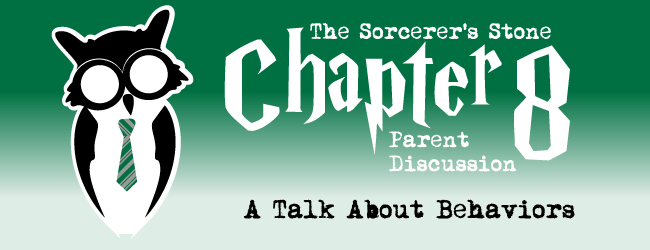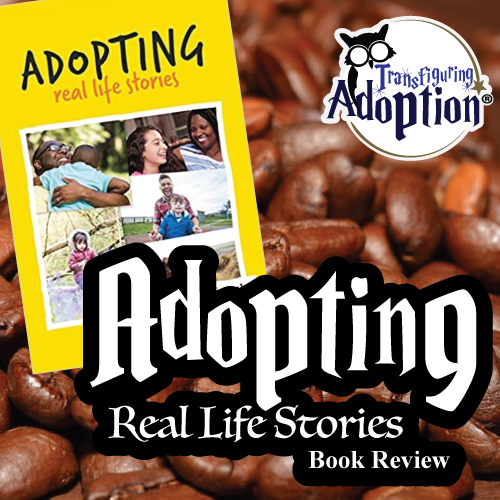Chapter 8 is the introduction of two polar opposites in Harry Potter’s life – Professor Snape and Hagrid. The differences in moods are so obvious in the chapter that even the youngest of my children noticed the two characters. Professor Snape plays the evil and unfair force in Harry’s school life while Hagrid is Harry’s confidant and friend.
The interesting concept that my family drew from this chapter is that if you go according to appearances, it should be Hagrid who is the frightening character. He is half-giant. He is larger than a normal man with a booming voice. However, it’s the ordinary looking school professor that is causing ill feelings.
As a foster and adoptive parent, my wife and I see behaviors in this way. What I mean is, sometimes there are positive behaviors that should be suspect and negative behaviors that really aren’t as bad as that might seem once you get to the bottom of things. Here are a few examples:
- Just the other day one of my children asked where mom was at, and I responded by saying she was at the grocery store. The child proceeded to ask permission to retrieve an iPad that was in my bedroom. Permission was granted, and the child continued to open my bedroom door and walk in on mom still at home and dressing for her trip to the grocery store. Most people would be so greatly embarrassed that the door would quickly be shut with exclamations of, “I’m so sorry! I forgot to knock!” The actual response was yells of rage at mom. Basically, mom was accused of being in the wrong and not being in the right place since the child had permission to be in the bedroom: a strange and angry response to an accident. After further exploration and discussion, my child confesses that they were scared and when he/she gets that scared, they just start yelling. It makes sense. A child who grew up in an environment of moving from home to home for 7 years and never being in control is striving to get control of an out-of-control situation by demanding/yelling that control be given to him.

- One child continuously must be watched because anything that looks tasty might end up in their mouth. On the surface this sounds like a normal case of curiosity. However, most children with normal mental function do understand after being told and sent to the emergency room that one should not try to eat such things as soap, dirt, deodorant, glow stick fluid, other people’s flavored medications, etc. This seems like a behavior that someone with suicidal tendencies would have. At the root problem, though, is the fact that this child did not have food in the biological home. Even though our home has never once run low on food, this child is constantly looking for the next substance to make a meal from in case all food were to magically vanish. The behavior is not then strange but a survival technique.

- One child in our home would walk around in a hunched over fashion and speak in a high pitched voice. This seems a strange behavior that would wear on the back muscles and make your throat scratchy. However, when you discover that this child believes that small and cute children aren’t punished or hurt, everything makes sense. If you can make yourself seem younger than what you are, you might avoid the angry eye of an adult. For this behavior, Margie and I actually spent many weeks forcing the child to stand straight and telling them, “Stand straight, and be proud of who you are.”
As a foster/adoptive parent, I’m sure that you have other interesting behaviors that don’t match up in a situation. Especially when you are dealing with abuse and neglect, there tend to be some interesting behaviors. I think the most difficult part is trying to rewire my own mind.
As a foster/adoptive parent you have to think differently. If a behavior looks like Professor Snape, you must figure out the root of the problem. Here are a few suggestions we have for discovering the root of behaviors but we want to hear from you also:
- Ask the child what they need – We have found that asking this question sometimes yields surprisingly informative responses.
- Figure out how the child has lost control – If a child had to care for themselves at a young age, it is going to be very difficult for them to feel like they don’t have control of their life.
- Research the topic – Dr. Karyn Purvis and her crew are champions at assisting people caring for foster/adoptive children. Check out their website here: empoweredtoconnect.org
Now It’s Your Turn:
- What are some strange behaviors you notice in your home?
- Do any of these behaviors push your buttons? Why?
Help Others:
We would love for you as always to share you ideas and questions that relate to this chapter. We welcome the advice and hope to hear from you soon.
Parents’ Discussions:
Ch. 01 | Ch. 02 | Ch. 03 | Ch. 04 | Ch. 05 | Ch. 06 | Ch. 07 | Ch. 08 | Ch. 09 | Ch. 10 | Ch. 11 | Ch. 12 | Ch. 13 | Ch. 14 | Ch. 15 | Ch. 16 | Ch. 17
Kids’ Discussions:
Ch. 01 | Ch. 02 | Ch. 03 | Ch. 04 | Ch. 05 | Ch. 06 | Ch. 07 | Ch. 08 | Ch. 09 | Ch. 10 | Ch. 11 | Ch. 12 | Ch. 13 | Ch. 14 | Ch. 15 | Ch. 16 | Ch. 17



